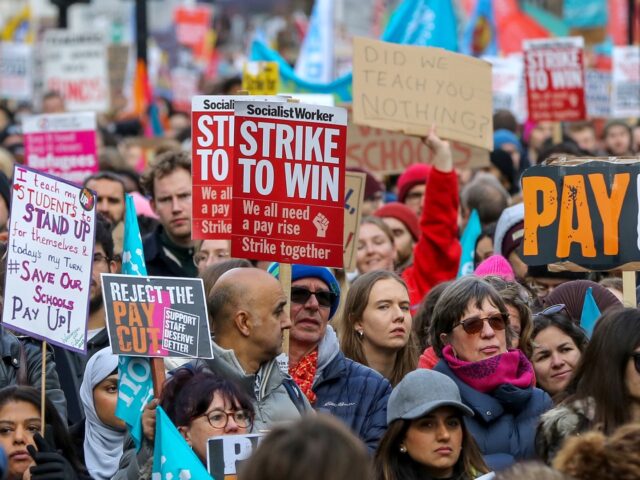Less than one-third of British teachers actually walked out of their classrooms this week, with the vast majority of schools remaining open to some extent, Cabinet minister Oliver Dowden revealed.
Contradicting claims from the striking teachers’ unions of widespread chaos, some 70 per cent of teachers did not participate in the so-called Walkout Wednesday protest to demand higher pay, meaning that 90 per cent of schools were open “in one capacity or another”.
Addressing the latest public sector strike, Chancellor of the Duchy of Lancaster Oliver Dowden told MPs: “I am deeply saddened by any interruption to the education of our children, particularly when they have suffered so much during Covid.
“I would though like to pay tribute to headteachers and others who ensured that around 90 per cent of schools were open in one capacity or another to ensure that we continued to have education for our children, and indeed the teachers, 70 per cent of whom did not participate in the strike.”
According to government statistics, 45.9 per cent of schools were fully operational on the strike day, while 44.7 per cent were open on a partial basis, and just 9.3 per cent were forced to close as a result of the teacher walkout.
As a whole, only 12 per cent of civil servants joined the strike on Wednesday as well, with Mr Dowden praising the majority of government workers for “ensuring that essential public services continued uninterrupted”.
Nevertheless, the strike day saw many parents forced to scramble, as the National Education Union called on teachers to refuse to disclose whether they would show up to work or not, meaning that some parents had to take unpaid time off work to watch their children.
UK Strike Fail: Army Replacement for Border Force Made Airports Run Smoother – Reports https://t.co/uOSaT2DgQF
— Breitbart London (@BreitbartLondon) December 24, 2022
Public sector strikes have rocked the country over the past two months, with left-wing unions demanding that government employees, many of whom earn more than the average Briton, receive pay increases to mitigate the cost of living crisis in the United Kingdom.
It is expected that next week ambulance workers, nurses, and university staff will all go on strike to demand pay hikes.
Polling has found that support for strikes among the public remains relatively high, with 41 per cent backing the teachers’ strikes compared to 33 per cent opposed. However, a decline in support for nurses’ strikes has been registered, with public support falling from 59 per cent in November to 45 per cent this month.
The government, which has so far seemingly tried to take a hands-off approach to the strikes, said that it is open to holding fresh talks with union bosses.
A Downing Street spokesman said: “As we’ve seen from the IMF [International Monetary Fund] just this week, inflation is one of the biggest risks to people’s pay packets and the Government will continue to take responsible action to ensure public sector workers are paid fairly but that it’s also affordable for the taxpayer.”
Britain's largest teachers' union has called for "activist training" on issues such as "whiteness" in order to make "white privilege and colonialism visible" in schools. https://t.co/eL9uQHY6xm
— Breitbart London (@BreitbartLondon) July 4, 2021
Follow Kurt Zindulka on Twitter here @KurtZindulka

COMMENTS
Please let us know if you're having issues with commenting.